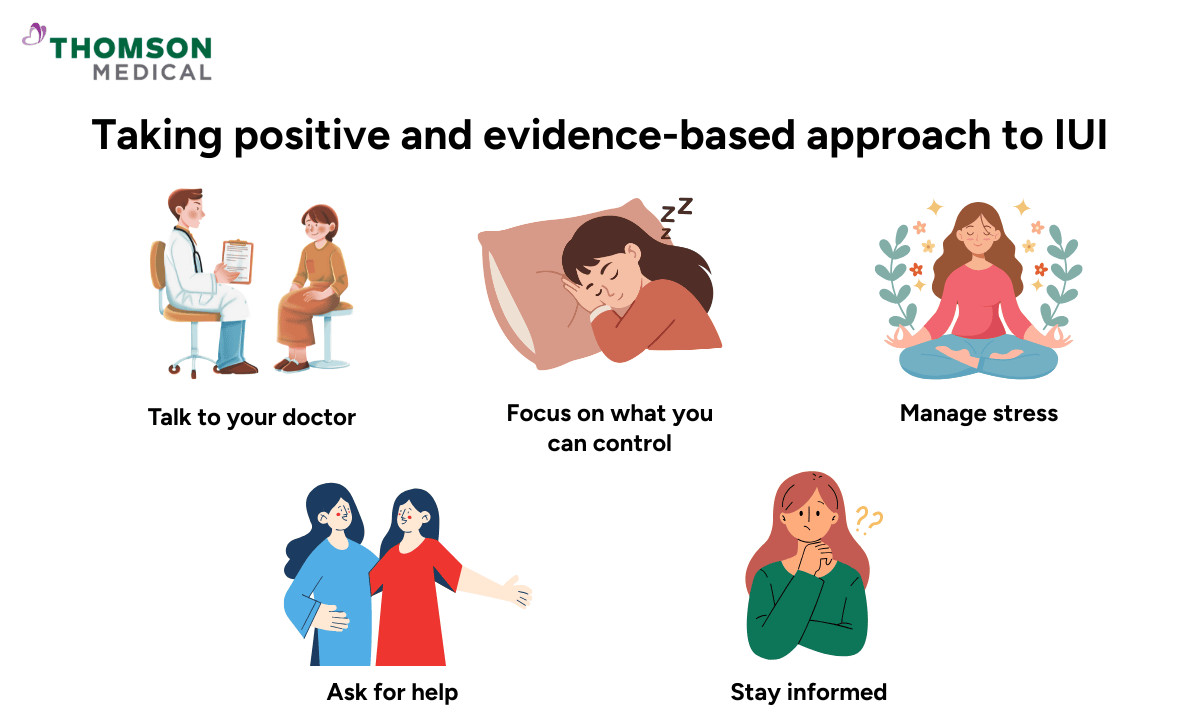Fertility treatments often stir up a mix of emotions, including hope, anxiety, or even just the longing to feel some sense of control over the process. If you’re preparing for or have just completed an IUI procedure, it’s natural to look for comfort wherever you can find it – even in familiar rituals or cultural beliefs that promise a bit of reassurance.
While these practices can offer emotional comfort, the truth is that IUI success depends on many medical and biological factors rather than luck or ritual. Understanding this balance between faith, emotion, and evidence-based care can help you approach your fertility journey with both clarity and peace of mind.
What is IUI?
Intrauterine insemination (IUI) is a common and affordable fertility treatment with minimal invasion. During this procedure, carefully selected and washed sperm are placed directly into your womb during ovulation to increase the chances of fertilisation.
Your doctor may recommend IUI if you and your partner are facing:
Mild male factor infertility
Unexplained infertility
Irregular ovulation
Cervical mucus issues
Conception with donor sperm
On average, about two weeks following IUI, your doctor will ask you to take a pregnancy test to determine whether the procedure was successful.
Why do superstitions surround fertility treatments like IUI?
The two-week wait before your first pregnancy test is often filled with questions and concerns.
You might think, “Am I pregnant?” hundreds of times a day. It’s natural to seek emotional reassurance to help you feel better or more in control during this uncertain time.
Over the years, the desire for hope and balance has led to many fertility rituals and superstitions. Some come from cultural traditions that have been passed down through the years, while others come from personal stories of success that family and friends share.
What science says about common IUI superstitions

Here are some widespread superstitions about IUI and fertility. Many of these beliefs stem from a deep desire for hope and comfort during the waiting period. Let’s look at some of the most common ones – and what science says about them.
Keeping your legs up after IUI
Some women believe that lying flat with their legs raised for 15-30 minutes helps keep sperm inside their womb.
In fact, a short rest after IUI is beneficial, but elevating the legs does not increase the chances of success. The sperm used in IUI are already injected past your cervix, so gravity doesn't have much of an effect. Your womb also helps move the sperm toward the egg.
Eating pineapple core
Bromelain is an enzyme found in the pineapple core that is believed to increase the chances of an embryo implanting in your womb.
Bromelain may help with inflammation and blood clotting, which are both important for fertility. However, there isn't strong scientific evidence that it helps with implantation after IUI.
Avoiding cold foods or drinks
In traditional Chinese medicine, cold foods and drinks are defined as:
Food and drink that come from the fridge or freezer
Dairy products
Raw foods
According to traditional medicine, these foods and drinks cool down your womb and take away the energy you need to get pregnant. As such, some women think that eating warm, cooked meals will help warm their bodies and stimulate blood flow to their wombs.
From a modern medical perspective, there’s no proof that skipping cold drinks improves IUI success – but if it makes you feel cared for or more at ease, there’s no harm in it. Just make sure that you’re still getting a good balance of nutrients.
Wearing fertility charms or crystals
Many women think that wearing or placing crystals like rose quartz, moonstone, or statues of fertility in their homes can boost their fertility energy. There is no scientific proof, but if these things make you feel better or help you relax, they may be good for your mental health.
Timed rituals and blessings
Some couples pray, visit temples, or ask for blessings before or after an IUI procedure. While there is no scientific proof that rituals affect fertility outcomes, they may be beneficial for your emotional well-being by bringing you peace.
If you’ve tried some of these rituals, you’re not alone – many women find comfort in small acts of hope during the IUI wait. What matters most is balancing that comfort with medical guidance.
At Thomson Medical, we understand that fertility is not just a physical journey but an emotional one too. If you have concerns about fertility beliefs or rituals, schedule a consultation with us. Our fertility specialists are here to listen and offer evidence-based care to help you move forward with confidence and peace of mind.
Our IUI specialists
Loading...
Can superstitions harm or help your IUI outcome?
The above superstitions have not been scientifically proven to increase IUI success. However, they might help you on your journey to getting pregnant in some ways, such as:
Reducing stress or anxiety
Increasing hope and emotional resilience
Encouraging healthy changes in your diet, rest, and mindfulness
That said, it's important to view superstitions as complementary practices, not substitutes for medical care. Here are some possible risks if superstitions are followed without medical guidance:
Delaying or avoiding the right medical care based on evidence
Following misinformation or unsafe advice
Feeling guilty or ashamed if IUI is not successful
Experiencing too much financial or emotional stress from excessive focus on rituals
For instance, eating pineapple in moderation is fine, but consuming too much can negatively affect your body, causing symptoms such as tongue irritation, bloating, diarrhoea, or even heartburn. Eating large amounts may also mean you miss out on other nutritious foods, leading to an unbalanced diet.
Taking a positive and evidence-based approach to IUI

Finding a balance between faith, science, and self-care is important for a healthy and positive two-week wait after IUI. Here are some suggestions to help you stay grounded during your journey to motherhood:
Be honest:
Talk to your doctor about any beliefs or rituals you want to follow to make sure they won’t affect your health.
Focus on what you can control:
Eating a balanced diet, getting enough sleep, and taking IUI medications as prescribed by your doctor can help you feel in control.
Manage stress:
Mindfulness, yoga, or spiritual practices may reduce your anxiety.
Ask for help:
Talking to your loved ones or joining support groups can provide valuable emotional support.
Stay informed:
Be cautious of advice from online sources or support groups, and always verify information with your doctor before following it.
Every fertility journey is deeply personal. Our specialists at Thomson Fertility Centre combine evidence-based medicine with compassionate support, helping you make informed decisions while staying true to your values and beliefs. Request an appointment today.
FAQ
How to sit after IUI?
After an IUI procedure, you should rest for 15-30 minutes, but there is no specific position you must maintain afterward. You can resume most daily activities and do light to moderate exercise after IUI, but you should avoid intense exercises like heavy lifting or jumping.
Is it okay to shower after IUI?
Yes, showering or bathing after IUI is safe and will not affect the outcome. However, you should avoid very hot baths, saunas, or steam rooms, as excessive heat may affect implantation and the early development of the embryo.
Can stress really affect IUI success?
While stress is unlikely to be the direct cause of IUI failure, it may influence your overall well-being and health. Meditation, yoga, and mindfulness are good ways to manage stress that can be beneficial for your fertility journey.
Should I follow cultural rituals if they bring comfort?
Emotional peace is important during your fertility journey. You can follow cultural rituals if they don't conflict with what your doctor says and provide you with comfort.
Can warm feet help implantation?
Many women believe that keeping their feet warm can support implantation by improving blood flow to their womb. However, the scientific support for this is lacking. You can wear socks and closed-toe shoes, or soak your feet if these things help you reduce stress and increase comfort.
Why do I have to wait two weeks after IUI?
After an IUI, you have to wait two weeks before you can take a pregnancy test. This waiting period is important because it allows time for a fertilised egg to implant in your womb and for your body to produce enough human chorionic gonadotropin (hCG) for a pregnancy test to detect it.
The information provided is intended for general guidance only and should not be considered medical advice. For personalised recommendations and advice based on your unique situation, please consult a specialist at Thomson Medical. Request an appointment with Thomson Medical today.
For more information, contact us:
Thomson Fertility
- Paragon: 6252 7766
Thomson Specialists (Women's Health)
Request an Appointment